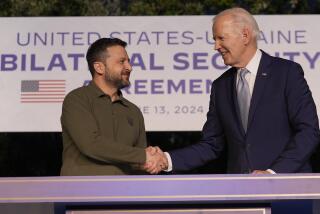Relieved West European Allies Hail U.S.-Soviet Agreement in Geneva
BRUSSELS — West European governments reacted with a mixture of relief and applause Wednesday to the U.S.-Soviet announcement of comprehensive nuclear disarmament negotiations but were warned against expecting too much too soon from the talks.
British Prime Minister Margaret Thatcher declared that Britain “warmly welcomed” the agreement.
After he briefed her in London on details of the agreement, Thatcher assured presidential national security adviser Robert C. McFarlane of Britain’s “continued support for the United States in the negotiations.”
Said one of the prime minister’s advisers, “There is more rather than less hope around today.”
Called ‘Encouraging’ An official West German government statement labeled the agreement as encouraging and said it is proof that Atlantic Alliance security policy works.
“I’m cautiously optimistic,” said Chancellor Helmut Kohl. “The atmosphere is not bad.”
Members of Secretary of State George P. Shultz’s Geneva negotiating team fanned out across Western Europe on Wednesday to brief the allies on the Geneva agreement.
In press conferences after the private consultations, U.S. officials were clearly attempting to keep expectations from rising too high, repeatedly stressing that Tuesday night’s accord marked only the beginning of a extremely difficult negotiating process.
McFarlane, addressing reporters in London, and Assistant Secretary of State for European Affairs Richard W. Burt, speaking to journalists a few hours later in Brussels, used almost identical language, noting that only determination could bring successful agreement.
‘Meaningful Agreement’ “It was patience and persistence that brought the Soviets back to the negotiating table, and it is likely to be patience and persistence that leads to a meaningful agreement,” Burt said.
In Brussels, representatives of the North Atlantic Treaty Organization were briefed by Burt, Edward L. Rowny, former chief negotiator at the strategic arms limitation talks, and Paul H. Nitze, Rowny’s counterpart in medium-range missile talks.
Nitze is scheduled to travel to Bonn today to personally brief Kohl.
“All the allies were satisfied with the outcome,” Burt told reporters. “One called it the best possible outcome, and I don’t think there was any dissent from that view.”
However, as an apparent reminder to Europeans of the difficulties that still lie ahead, Burt charged that since last November, when it agreed to the Gromyko-Shultz meeting just completed in Geneva, Moscow had added to its SS-20 medium-range nuclear missile strength.
” . . . The Soviets have opened an additional SS-20 base, bringing the total force of launchers at operational bases to 396,” Burt charged. “Additionally, the Soviets are continuing a large and vigorous SS-20 base construction program in both the Eastern and Western U.S.S.R.”
Burt declined to say where the new base was located.
At a Tuesday night news conference in Geneva, Soviet Foreign Ministry spokesman Vladimir B. Lomeiko called talks of additional SS-20 deployment “an invention.”
The commitment to renewed negotiations is expected to bolster elements in the Belgian and Dutch governments that support the scheduled deployment of 48 nuclear-tipped cruise missiles in their countries in the next 18 months. Proponents of the deployment maintain that the new NATO missiles were one factor that brought the Soviets back to the negotiating table.
Although both governments committed themselves in 1979 to participate in the West European deployment of 572 U.S. nuclear missiles to balance the Soviet SS-20 buildup, each has since hesitated in the face of stiff political opposition. There are signs that opponents of deployment may also step up their efforts, arguing that going ahead with stationing now could sour the present atmosphere of good will.
Belgian Premier Wilfried Martens was briefed Wednesday by Nitze and is scheduled to visit Washington next week for talks with President Reagan.
The director of the Arms Control and Disarmament Agency, Kenneth L. Adelman, will take advantage of previously planned visits to Hungary, Yugoslavia and Romania next week to brief those governments on the talks.
As expected, most official reaction in Europe also stressed the need for continued close consultations between the United States and its European allies on negotiating tactics.
More to Read
Sign up for Essential California
The most important California stories and recommendations in your inbox every morning.
You may occasionally receive promotional content from the Los Angeles Times.










